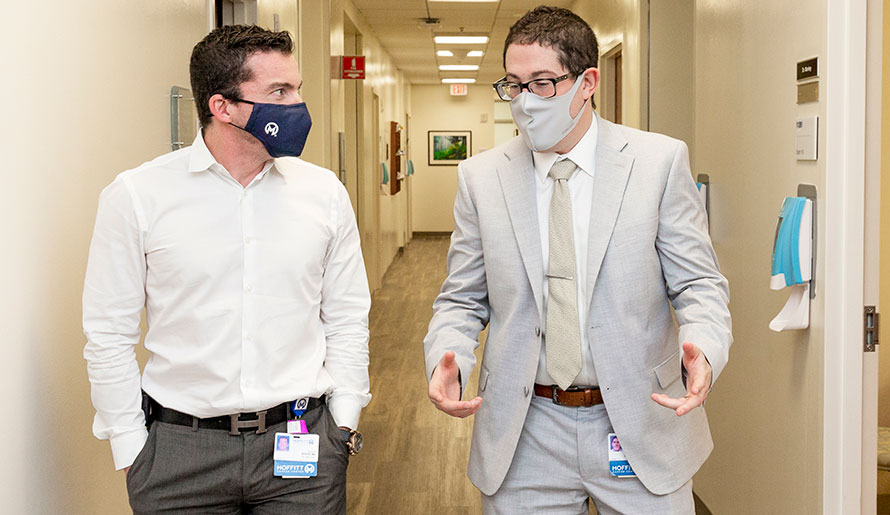Revisiting Mechanisms of Resistance to Immunotherapies in Metastatic Clear-Cell Renal-Cell Carcinoma
The urologists in the Department of Genitourinary Oncology at Moffitt Cancer Center, Drs. Monica Chatwal, Jad Chahoud, and Philippe Spiess, co-authored a publication entitled “Revisiting Mechanisms of Resistance to Immunotherapies in Metastatic Clear-Cell Renal-Cell Carcinoma,” which focuses on the treatment of renal-cell carcinoma (RCC.)
 Renal-cell carcinoma (RCC) remains a common cause of morbidity and mortality worldwide. It is the eighth most common cancer diagnosed in the United States, and in 2022, there were an estimated 79,000 new cases diagnosed, accounting for 4% of new cancer diagnoses in the country. Though the relative 5-year survival is nearly 77%, the prognosis of advanced RCC remains dismal with an estimated 5-year survival of 15%. Clear-cell renal-cell carcinoma (ccRCC) still accounts for most of RCC, with non-clear-cell histology making up about 25%.
Renal-cell carcinoma (RCC) remains a common cause of morbidity and mortality worldwide. It is the eighth most common cancer diagnosed in the United States, and in 2022, there were an estimated 79,000 new cases diagnosed, accounting for 4% of new cancer diagnoses in the country. Though the relative 5-year survival is nearly 77%, the prognosis of advanced RCC remains dismal with an estimated 5-year survival of 15%. Clear-cell renal-cell carcinoma (ccRCC) still accounts for most of RCC, with non-clear-cell histology making up about 25%.
Historically, standard chemotherapy and radiation have been ineffective for ccRCC. Clinical studies suggested an immunologic role in the growth and control of RCC, particularly the presence of tumor-infiltrating lymphocytes (TILs) within the tumor and the process of immune evasion. Immune therapies were explored as potential therapeutic options, particularly immune cytokines such as interferons and interleukin-2 (IL-2) and later immune checkpoint inhibitors (ICIs). A better understanding of the role of programmed death 1 (PD-1), programmed death ligand 1 (PDL1), and cytotoxic T-lymphocyte–associated protein 4 (CTLA4) led to the eventual use of ICIs in metastatic renal-cell carcinoma (mRCC).
The management of mccRCC has progressed substantially with the advent of checkpoint inhibitors and targeted oral therapies, alone and/or in combination. However, innate or developed resistance to these therapies remains an ongoing challenge, particularly to ICIs. Several of the known mechanisms of resistance have been well defined, but recent progression in cellular therapies helps to expand the armamentarium of potential combination options that may overcome these modes of resistance and improve long-term disease control and survival for an otherwise dismal disease.
If you’d like to refer a patient to Moffitt, complete our online form or contact a physician liaison for assistance. As part of our efforts to shorten referral times as much as possible, online referrals are typically responded to within 24 - 48 hours.
